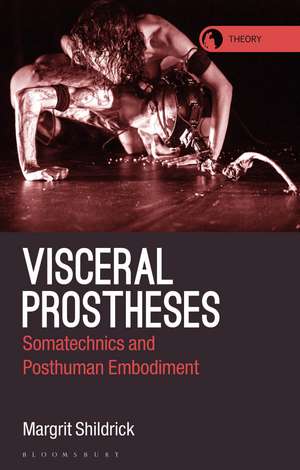Visceral Prostheses: Somatechnics and Posthuman Embodiment: Theory in the New Humanities
Autor Professor Margrit Shildricken Limba Engleză Paperback – 18 oct 2023
| Toate formatele și edițiile | Preț | Express |
|---|---|---|
| Paperback (1) | 192.30 lei 6-8 săpt. | |
| Bloomsbury Publishing – 18 oct 2023 | 192.30 lei 6-8 săpt. | |
| Hardback (1) | 540.65 lei 6-8 săpt. | |
| Bloomsbury Publishing – 20 apr 2022 | 540.65 lei 6-8 săpt. |
Preț: 192.30 lei
Preț vechi: 249.87 lei
-23% Nou
Puncte Express: 288
Preț estimativ în valută:
36.80€ • 38.20$ • 30.69£
36.80€ • 38.20$ • 30.69£
Carte tipărită la comandă
Livrare economică 22 martie-05 aprilie
Preluare comenzi: 021 569.72.76
Specificații
ISBN-13: 9781350224940
ISBN-10: 1350224944
Pagini: 272
Dimensiuni: 156 x 234 x 25 mm
Greutate: 0.39 kg
Editura: Bloomsbury Publishing
Colecția Bloomsbury Academic
Seria Theory in the New Humanities
Locul publicării:London, United Kingdom
ISBN-10: 1350224944
Pagini: 272
Dimensiuni: 156 x 234 x 25 mm
Greutate: 0.39 kg
Editura: Bloomsbury Publishing
Colecția Bloomsbury Academic
Seria Theory in the New Humanities
Locul publicării:London, United Kingdom
Caracteristici
This will be of interdisciplinary appeal: from philosophers interested in identity and the posthuman to scholars working in the cutting-edge fields of biomedicine and critical disability studies
Notă biografică
Margrit Shildrick is Guest Professor of Gender and Knowledge Production at Stockholm University, Sweden. Her previous books include: Embodying the Monster: Encounters with the Vulnerable Self (2002) and Dangerous Discourses of Disability, Subjectivity and Sexuality (2009).
Cuprins
Acknowledgments Introduction Part 1: From Mechanical To Visceral Prostheses Chapter 1: Disability Chapter 2: Organ And Tissue Transplantation Chapter 3: Microchimerism And The Microbiome Part 2: Some Case Studies Chapter 4: Dementia Chapter 5: Stem Cell Transplant Chapter 6: Surrogacy Part 3: Towards Posthuman Embodiment Chapter 7: Life And Death Chapter 8: The Ethics Of A New Imaginary Conclusion References Index
Recenzii
Margrit Shildrick is an important and original thinker whose work brilliantly brings together bioethics, feminist and queer theories, and critical disability studies. In Visceral Prostheses, Shildrick extends her thinking on posthuman embodiment into new territories, including the microbiome and microchimerism. Her analyses of various case studies of prostheses as both external and internal to corporeality takes feminist thought in new directions.
A fascinating reconceptualization of the notion of prosthesis through the lens of critical disability studies that views a range of contemporary medical interventions involving live but non-self materials as visceral prostheses requiring a reconceptualization of the human body as open to creative expansion. To frame stem cell transplants, heart and liver transplants, or even fecal transplants as prosthetics is reframes our conventional understanding of prosthetics as remedying a lack. Instead, these are all seen as journeys into a new realm of problematized and extended selfhood. For those engaged in critical disability studies, this reconfiguration of prosthesis is exciting. And for scholars engaged in studying biomedical innovations, the foundational role played by critical disability studies in this analysis of new biomedical strategies promises to reorient medicine in productive ways.
A fascinating reconceptualization of the notion of prosthesis through the lens of critical disability studies that views a range of contemporary medical interventions involving live but non-self materials as visceral prostheses requiring a reconceptualization of the human body as open to creative expansion. To frame stem cell transplants, heart and liver transplants, or even fecal transplants as prosthetics is reframes our conventional understanding of prosthetics as remedying a lack. Instead, these are all seen as journeys into a new realm of problematized and extended selfhood. For those engaged in critical disability studies, this reconfiguration of prosthesis is exciting. And for scholars engaged in studying biomedical innovations, the foundational role played by critical disability studies in this analysis of new biomedical strategies promises to reorient medicine in productive ways.













